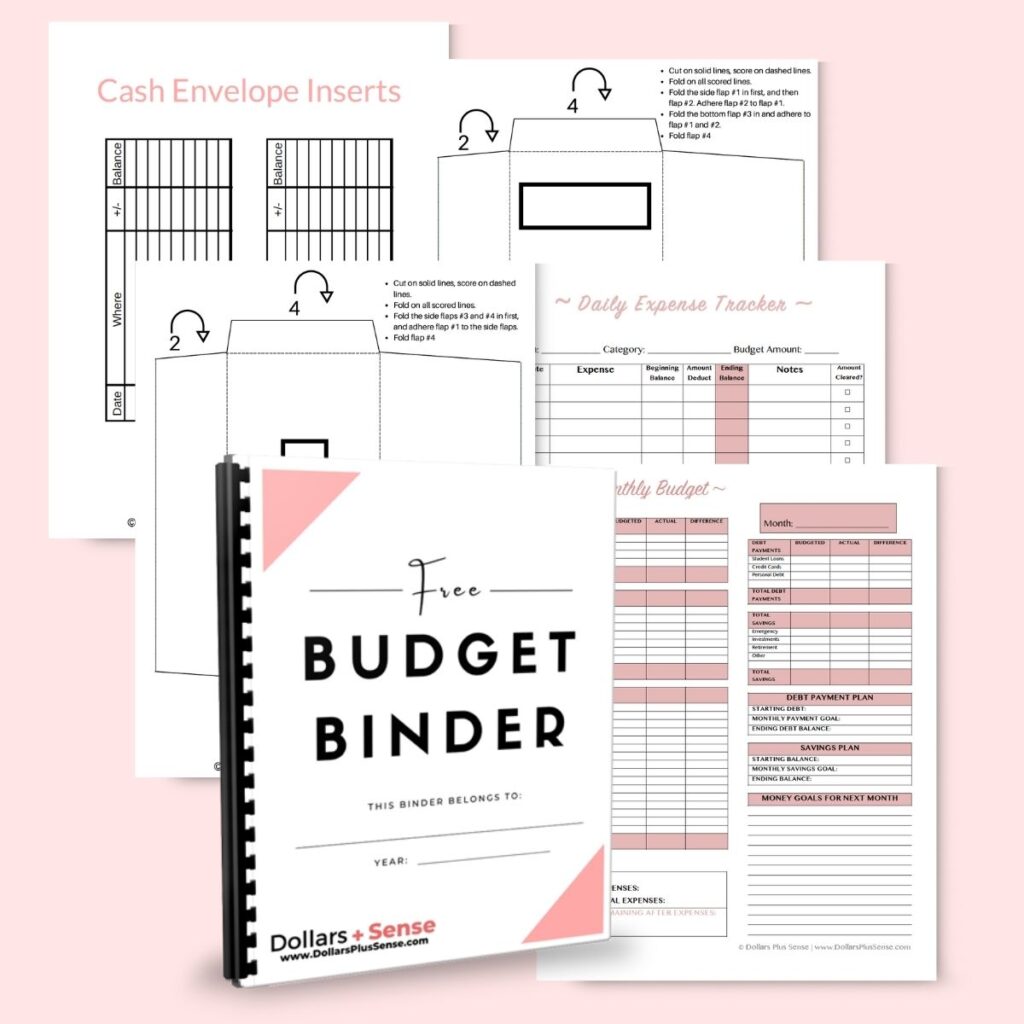If you landed on this blog post, you’re probably asking yourself “Why can’t I ever save money?” It’s important to find out the mystery as to why you can’t save so you can make a better plan to change your situation. In this article, I’m going to show you 19 reasons why you’re having a hard time saving money.
Why Can’t I Ever Save Money?
You Don’t Have A Budget
Not having a budget is usually the main reason why you can’t save money. It’s almost impossible to save money if you have no idea how much is going out and coming in. A budget can help you figure out where you’re money is going and show you places you can cut back and save more money
If you’re just starting out, you can download my FREE Monthly Budget Worksheet.
However, if you want something a little more sophisticated, you can get my Monthly Budget Template. This is the template I actually used to save 50% of my income every month, and it is the same template I use to this date.
Related Article: How I Use My Monthly and Yearly Household Budget Spreadsheet
You Don’t Track Your Spending

A lot of people don’t like to track their spending because it takes up too much time, or they’re too afraid to see how much they’re actually spending. Face your fear, and start tracking your spending today.
Once you make a budget and allocate where your money is going, you need to track your spending to make sure you are sticking to the plan. A budget is useless if you don’t follow it. Therefore, it is so important for you to take the time to track your spending so you can make sure you are staying on track with your budget.
It only takes a few minutes a day, and it can have a major impact on your ability to save more money.
You can download my FREE Daily Expense Tracker to help you with this. Print out multiple sheets (one for each spending category or sub-category). Then put all your sheets in your finance binder or a folder.
Related Article: Budget Organization Tools: The Ultimate Personal Finance Binder
You’re Not Asking For Help

You’re probably tired of your financial situation and ready to do the work, but you just don’t know where to start. Maybe you have financial goals you want to reach, but you have no idea what’s the best way to get there. If you struggle with making a financial plan, don’t be afraid to ask for help.
Look for someone who is where you want to be and has accomplished what you want in life. Ask them to help or mentor you. Another option is to work with an expert who knows what to do and have experience with other people in similar financial situations as yours.
I have mentored dozens of people to help them reach their financial goals. I can help guide you and hold you accountable to go through your financial journey. So, if you would like to work together contact me for a FREE 15-minute consultation to see how I work with my clients.
You’re Not Motivated Enough
You’re not saving any money because you’re not motivated enough to stick to a financial plan. You find that sticking to a budget is just too hard, so you quit.
In situations like this, I recommend you have an accountability partner. There are several ways you can make sure you’re held accountable. For example, you can:
- Ask a family member or friend to be the person you call when you need a little more motivation;
- Join a group of like-minded people trying to achieve the same goals as you; or
- Hire a personal finance coach.
Related Article: Coaching Success Story: How This Teacher Paid Off $14,000 In 2 Years
You’re Not Devoting Enough Time To Your Finances
Another reason why you’re not saving any money is because you’re simply not spending any time on your finances. It’s so important to take at least an hour a week just to go over your budget and spending. It doesn’t have to be a LOT of time, but you need to spend enough time on your financial to make sure you’re sticking to your financial plan and meeting your goals.
Related Article: Why You Need A Financial Wellness Coach
You Don’t Practice Delayed Gratification

I’m not going to lie…I had this issue as well before I started my financial journey. I felt like I worked hard and deserved the items I bought—regardless if I could afford it or not.
By thinking you deserve everything now is exactly why you don’t have any money. You need to start practicing delayed gratification and wait to buy something only when you can truly afford it.
You’re Spending Too Much On Housing
It makes it almost impossible to save money if you’re spending too much on your housing. Since housing is usually the biggest expense we have, spending too much in this area can make or break your budget. Financial experts agree, in general, that your housing expenses should be 25% or 30% if you own your house (including property taxes, home insurance, and maintenance/repairs).

My Monthly Budget template has a “Housing Recommendation” section to make it easy and remind you how much you should be spending on your rent or mortgage.


If you notice your spending on housing is significantly higher than what’s recommend, think of ways you can cut back spending in that area.
You Don’t Set Any Goals
You might not have any money because you’re not setting any financial goals. Those with goals are 10x more likely to succeed. People who identify their goals and work towards them usually accomplish their goals, and accomplish them quicker. So if you don’t have any goals or plans for your money, you will most likely do nothing.
It’s important to have a clear goal in mind so that you know exactly what you are working for and what you need to do to get there. Ask yourself what do you want out of life? Where do you want to be next year, five years, ten years or thirty years from now? Make goals and prioritize them.
To achieve your goals, they need to be written out and planned for. Download this FREE Daily Goal Planner to make sure you do something and take action every day.
Related Article: 5 Ways To Be More Productive: The Ultimate Productivity Bundle
You Don’t Realize Every Little Bit Counts

When it comes to saving money, every little bit counts. You might not save any money because you feel like saving small amounts won’t make a difference.
If you simply save as little as $100 per month, at a modest 2% interest on your money, you will have $1,316 in one year; $66,426 in 5 years; and $49,539 in 30 years! As you can see, that’s a LOT more than $0!
Try this cool compound interest calculator from Nerd Wallet to play around how much your future savings balance could be.
You’re Not Getting Educated About Your Finances
You need to increase your financial literacy so you can learn more ways to save money. You can get more educated about your finances by reading books, reading blogs, listening to podcasts, and getting a mentor.
By getting more educated about your finances, you’re putting yourself in a better position to succeed. You should never stop learning.
You’re Paying Too Much In Fees
It’s so important to pay attention to the fees you pay because this can eat away at your savings. Some fees you need to pay attention to are:
- Late payment fees
- Overdraft fees
- Monthly maintenance fees
- Paper statement fees
- Account closure fees
- Inactivity or escheatment fees
- Card replacement fees
- Returned item fees
- Transaction fees
- Management fees
- Annual fees
- Foreign transaction fees
Just to name a few. These fees can really add up and prevent you from having more money to put towards savings.
You Have Too Much Debt

If all of your income is going towards debt payments, it leaves little to no money left for savings after you pay your other monthly expenses. Because of this, it is SO important to limit the amount of high interest debt that you have.
If you have a staggering amount of debt, you need to make a debt repayment plan. Use this FREE Debt Worksheet found in my Resource Library to help you keep track of all the debt that you own and need to pay off.
If you want to learn more about how you can pay off your debt fast, read my article “How To Pay Debt Faster (Even If You Have No Money And A Low Income).”
Related Article: Debt Snowball Vs. Debt Avalanche: Which Debt Payoff Method is Better?
You Keep Putting It Off
You keep putting off saving for your future because you rather “enjoy” your money now. By waiting to save more money because you think you will have time to do it later, you’re not setting your future self up for success. Not to mention you’re losing out on the power of compound interest.
The sooner you begin saving, the more time your money has to grow and compound. Compounding is a powerful wealth-building tool because your interest gains interest.
You Have F.O.M.O.

FOMO stands for “fear of missing out.” A lot of my clients say they have a hard time sticking to their budget because they just can’t say “no” when friends invite them out. The reality is you can’t do everything all at once, or afford the same lifestyle as some of your family or friends.
You need to learn to say no sometimes. No one is responsible for your future but you. No one is going to pay your bills or save for your financial goals but you. So if you can’t afford to do something, you have to learn to say no. Your true friends will understand and support your decision.
Focus on what’s more important…and that’s reaching your financial goals.
Related Article: Don’t Let “Keeping Up With The Joneses” Make You Broke
You Don’t Have An Emergency Fund
Preparing for the unexpected is necessary if you want to save money every month. Not having an emergency fund makes it very hard to save money because if an emergency happens, you’re forced to rely on credit cards or take out other high-interest loans.
An emergency fund is money set aside to cover large unexpected expenses or to help you through hard financial times—like a job loss. Your emergency fund should be 3-6 months worth of necessary expenses; but at the very least $1,000.
You don’t want to make progress with your financial goals, and then get thrown off by an emergency. You should have enough cash available to help you through hard financial times.
Your Expenses Are Too High

If you have more expenses than income, your expenses are too high and you have no money left over for savings. If this is the case, you need to find ways to cut your expenses. Having a budget will help you identify areas you need to cut expenses.
A lot of financial experts would recommend you review your budget and eliminate all small unnecessary expenditures; however, I think you need to first focus on cutting larger expenditures.
The reasoning is since most of our money goes towards the larger budget categories—such as housing, transportation, and food—those are the areas where you can make the biggest impact and recapture the most dollars.
Keep in mind, I’m not saying you should not focus on the smaller categories at all, I’m just saying I would focus on cutting my expenses in my high spending categories before I turn to cutting my small expenditures.
Related Articles: Cutting Your Monthly Expenses: Why It Is Absolutely Necessary
You Don’t Make Enough Money

There are only so many expenses you can cut before you start to feel deprived. Sometimes you can’t save any money because you simply don’t make enough money. If that’s the case, you need to find ways to increase your income.
There are so many other ways you can make more money. For example, you can increase your income by:
- Making more money in your current job;
- Moving to a company that may offer more room for advancement;
- Finding a part-time job;
- Starting a side hustle or part-time business; or
- Establishing a passive income.
You can read more about increasing your income in “5 Ways To Increase Your Income.”
You Don’t Pay Yourself First
If you don’t pay yourself first, chances are you wont have any money left over at the end of the money to save. You should pay yourself first every time you get paid; and whatever’s left over you can spend on your expenses.
I recommend you set an automatic transfer to your online savings account every pay period as soon as you get paid to ensure you’re paying yourself first.
Just make sure you do not rely on your credit cards to make up for any overspending. If you do, then you’re not truly saving as much as you think you are, and the whole system will collapse.
You’re Not Investing

Finally, you cannot only save your way to your financial goals because that would take forever and your money will erode over time thanks to inflation. This is because the cost of living is increasing faster than any rate of return offered to you by a bank.
In the United States, the historical average rate of inflation is approximately 3%. Since most banks are giving a return of less than 3%, you have to invest your money to actually grow your wealth—saving is not enough.
There are so many ways you can invest your money. Some ways include investing in stocks, bonds, real estate, and/or a business. You want to invest in things that produce income and increase in value.
I like to invest in real estate and the stock market because in the long term it will increase in value over time, and it can also produce an income through cash flow.
When investing in the stock market, I personally use Robinhood.com to purchase individual stocks. I like this website and app because you can buy and sell stocks for free—there are no commissions or fees. Most other brokerage firms charge at least a $4.95 fee per trade, and some have hidden fees.
Sign up today and you and I can get a free stock like Apple, Ford, or Sprint. With Robinhood you also don’t need a minimum account balance, so you can get started right away.
If you are new to investing in the stock market and want to learn more, read my article “Best Ways To Invest In The Stock Market For Beginners.”
Summary
There are so many reasons why you’re not saving any money. Now you no longer need to ask yourself “Why can’t I ever save money?” because you know. It’s important to know which one of these missteps you’re making so you can turn your financial situation around. By changing just a few of these mistakes, you will be on the road to saving more money than you ever did before.
If you want to remember this article, pin it to your favorite Pinterest board.






